
Material and resources regarding First Nations peoples and cultures has historically been created and recorded by non-Indigenous people and may not have had the input of First Nations peoples themselves. As a result, this material may contain cultural inaccuracies and misinterpretations, or words and descriptions which could be considered insensitive, outdated and/or offensive in today's context.
 Aboriginal and Torres Strait Islander people should be aware that the resources within this guide may contain images, voices, or names of deceased persons.
Aboriginal and Torres Strait Islander people should be aware that the resources within this guide may contain images, voices, or names of deceased persons.
 The college welcomes your feedback regarding any potential omissions, misrepresentations, or inaccuracies regarding First Nations peoples, as well as suggestions for additional resources.
The college welcomes your feedback regarding any potential omissions, misrepresentations, or inaccuracies regarding First Nations peoples, as well as suggestions for additional resources.
How to access e-books
 Use your ANZCA college ID (or staff username) and password to access library e-resources.
Use your ANZCA college ID (or staff username) and password to access library e-resources.
 Having trouble logging into e-resources? Try emptying your browser cache, closing and reopening your browser and trying again.
Having trouble logging into e-resources? Try emptying your browser cache, closing and reopening your browser and trying again.
 Forgotten your ANZCA password? Try resetting your password using the "Forgot Password?" link and/or messaging the "Technical support" via the college contact form
Forgotten your ANZCA password? Try resetting your password using the "Forgot Password?" link and/or messaging the "Technical support" via the college contact form
 Can't find your book online? Borrow a print copy or request a chapter via our article request service
Can't find your book online? Borrow a print copy or request a chapter via our article request service
 Experiencing difficulties, or need help accessing e-books? Contact the Library
Experiencing difficulties, or need help accessing e-books? Contact the Library
 For further information about searching and accessing e-books, see the E-books guide
For further information about searching and accessing e-books, see the E-books guide
Borrowing books
 ANZCA library provides access to a large range of print items, specialising in anaesthesia and pain medicine-related titles.
ANZCA library provides access to a large range of print items, specialising in anaesthesia and pain medicine-related titles.
 For further information about requesting books, see the Borrowing books page
For further information about requesting books, see the Borrowing books page
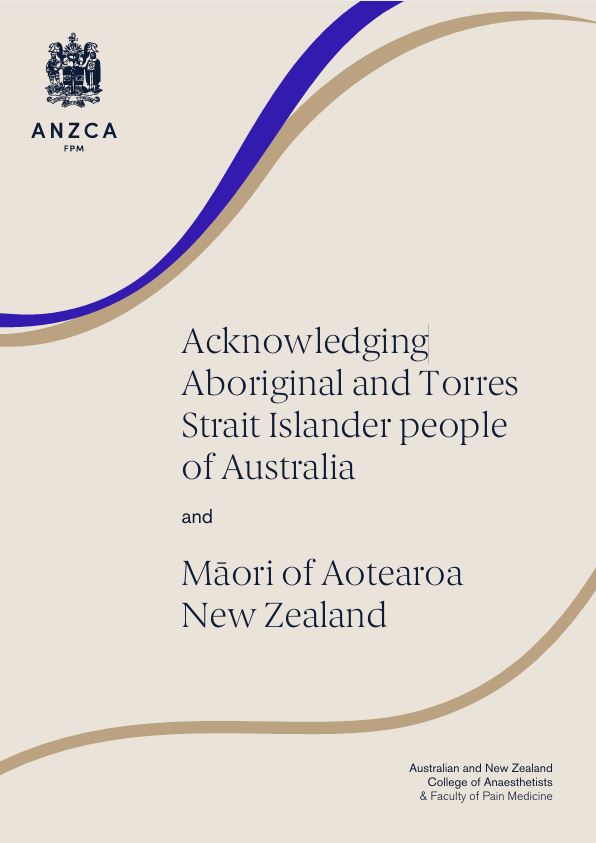 Acknowledging Aboriginal and Torres Strait Islander people of Australia and Māori of Aotearoa New Zealand
by
This guide is to provide ANZCA staff and members with information on using respectful and inclusive language and terminology and recognising the Aboriginal and Torres Strait Islander people as the Traditional Custodians of Country at official college meetings and events in Australia and ngā iwi Māori as the Tangata Whenua of Aotearoa.
Acknowledging Aboriginal and Torres Strait Islander people of Australia and Māori of Aotearoa New Zealand
by
This guide is to provide ANZCA staff and members with information on using respectful and inclusive language and terminology and recognising the Aboriginal and Torres Strait Islander people as the Traditional Custodians of Country at official college meetings and events in Australia and ngā iwi Māori as the Tangata Whenua of Aotearoa.
 Cultural Safety in Health: Professional Practice, Pedagogy and Research
by
Cultural safety seeks to address power and privilege imbalances in institutions and throughout society. It addresses systemic, scientific, and personal racism, which create and sustain health inequalities in neo-colonial societies such as Australia and Aotearoa/New Zealand. This book aims to provide health students, their educators and practicing health professionals with an in-depth understanding of cultural safety and guidance on developing the key skills required to ensure culturally safe and respectful care in diverse health professions.
Cultural Safety in Health: Professional Practice, Pedagogy and Research
by
Cultural safety seeks to address power and privilege imbalances in institutions and throughout society. It addresses systemic, scientific, and personal racism, which create and sustain health inequalities in neo-colonial societies such as Australia and Aotearoa/New Zealand. This book aims to provide health students, their educators and practicing health professionals with an in-depth understanding of cultural safety and guidance on developing the key skills required to ensure culturally safe and respectful care in diverse health professions.
 Indigenous Referencing Guidance for Indigenous Knowledges.
by
The Indigenous Knowledge Attribution Toolkit (IKAT) will be of particular use to students and library staff. This includes a decision tree to provide guidance for assessing content and attribution, as well as a citation and referencing guide with examples that include Indigenous attribution.
Indigenous Referencing Guidance for Indigenous Knowledges.
by
The Indigenous Knowledge Attribution Toolkit (IKAT) will be of particular use to students and library staff. This includes a decision tree to provide guidance for assessing content and attribution, as well as a citation and referencing guide with examples that include Indigenous attribution.
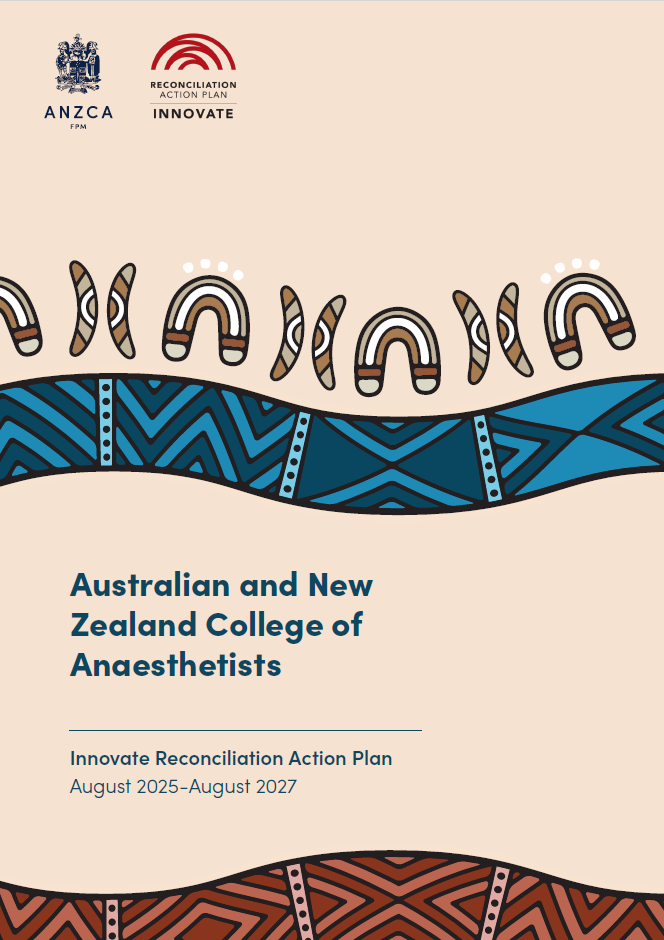 Innovate Reconciliation Action Plan (RAP): August 2025-August 2027
by
Innovate Reconciliation Action Plan (RAP): August 2025-August 2027
by
 LIME Good Practice Case Studies: Volume 4 2017
by
The LIME Good Practice Case Studies Resources showcase examples of good practice in Indigenous medical and health education from schools and specialist colleges across Australia and Aotearoa/New Zealand.
LIME Good Practice Case Studies: Volume 4 2017
by
The LIME Good Practice Case Studies Resources showcase examples of good practice in Indigenous medical and health education from schools and specialist colleges across Australia and Aotearoa/New Zealand.
 (Burda-burda Balayi) Health Professionals and Indigenous Health: Working at the Interface
by
Indigenous voices and perspectives on how to provide positive outcomes in Aboriginal and Torres Strait Islander healthcare. Burda-burda Balayi Health Professionals and Indigenous Health: Working at the Interface presents a strengths-based focus to help students and practitioners build their understanding of self and others in professional practice to ensure better health outcomes for Aboriginal and Torres Strait Islander peoples. The text includes Indigenous and non-Indigenous contexts of history, society and culture, and topics include cultural safety, truth telling, colonialism and shared futures. This book critically examines dominant Western health frameworks that essentialises Aboriginal and Torres Strait Islander cultures and health. By providing historical and social context and covering issues affecting public health policy and primary health practice, it aims to diminish conscious bias and racism. With a strong emphasis on research-based Indigenous voices and perspectives, this book provides a culturally safe framework for you to understand the importance of treating Aboriginal and Torres Strait Islander peoples effectively and the knowledge needed to do so.
(Burda-burda Balayi) Health Professionals and Indigenous Health: Working at the Interface
by
Indigenous voices and perspectives on how to provide positive outcomes in Aboriginal and Torres Strait Islander healthcare. Burda-burda Balayi Health Professionals and Indigenous Health: Working at the Interface presents a strengths-based focus to help students and practitioners build their understanding of self and others in professional practice to ensure better health outcomes for Aboriginal and Torres Strait Islander peoples. The text includes Indigenous and non-Indigenous contexts of history, society and culture, and topics include cultural safety, truth telling, colonialism and shared futures. This book critically examines dominant Western health frameworks that essentialises Aboriginal and Torres Strait Islander cultures and health. By providing historical and social context and covering issues affecting public health policy and primary health practice, it aims to diminish conscious bias and racism. With a strong emphasis on research-based Indigenous voices and perspectives, this book provides a culturally safe framework for you to understand the importance of treating Aboriginal and Torres Strait Islander peoples effectively and the knowledge needed to do so.
 2017 AMA Report Card on Indigenous Health: a national strategic approach to ending Chronic Otitis media and its life long impacts in Indigenous communities
by
An annual series.
2017 AMA Report Card on Indigenous Health: a national strategic approach to ending Chronic Otitis media and its life long impacts in Indigenous communities
by
An annual series.
 Aboriginal and Torres Strait Islander Patient Care Guideline
by
Aboriginal and Torres Strait Islander Patient Care Guideline
by
 AIATSIS Code of Ethics for Aboriginal and Torres Strait Islander Research
by
The purpose of the AIATSIS Code of Ethics for Aboriginal and Torres Strait Islander Research (the AIATSIS Code or this Code) is to promote ethical and responsible practice in Aboriginal and Torres Strait Islander research in Australia, to increase the contribution of Indigenous knowledge to Australian research, to ensure research has a positive impact for Aboriginal and Torres Strait Islander peoples, and to continuously improve the quality and standards of research in this area.
AIATSIS Code of Ethics for Aboriginal and Torres Strait Islander Research
by
The purpose of the AIATSIS Code of Ethics for Aboriginal and Torres Strait Islander Research (the AIATSIS Code or this Code) is to promote ethical and responsible practice in Aboriginal and Torres Strait Islander research in Australia, to increase the contribution of Indigenous knowledge to Australian research, to ensure research has a positive impact for Aboriginal and Torres Strait Islander peoples, and to continuously improve the quality and standards of research in this area.
 The Australian Indigenous HealthInfoNet Guidelines for Aboriginal and Torres Strait Islander Terminology
by
Guidance for staff on appropriate terminology when working with Aboriginal and Torres Strait Islander people and communities, and for use in all relevant policy, planning, programs, resource development and published materials.
The Australian Indigenous HealthInfoNet Guidelines for Aboriginal and Torres Strait Islander Terminology
by
Guidance for staff on appropriate terminology when working with Aboriginal and Torres Strait Islander people and communities, and for use in all relevant policy, planning, programs, resource development and published materials.
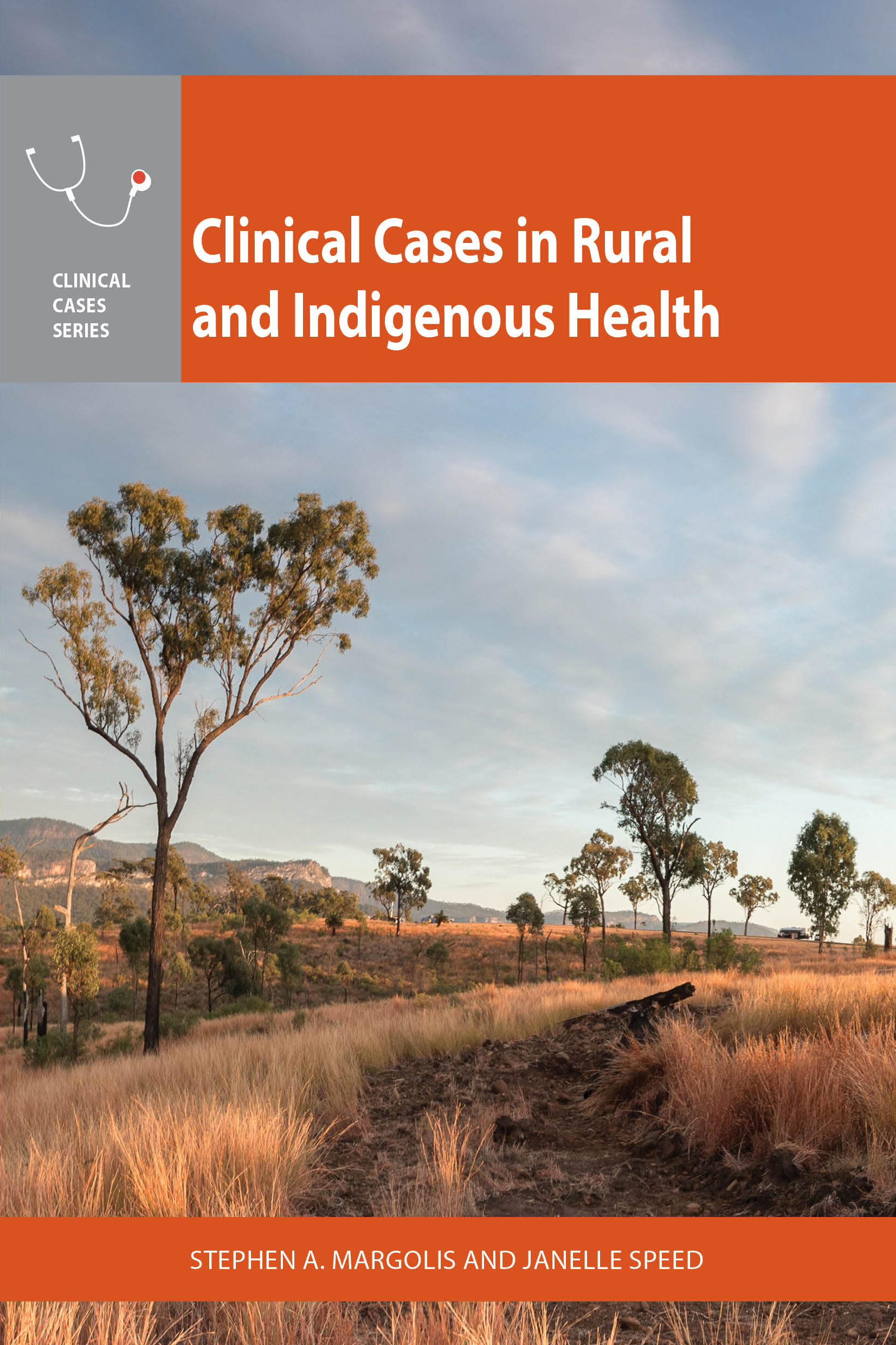 Clinical Cases in Rural and Indigenous Health
by
This book focusses attention on the challenges presented when providing clinical care in rural Australia. The cases are set across a broad range of locations covering much of the breadth and depth of the rural Australian experience. Each case is in a different location, where the logistical challenges are presented in detail to help the reader immerse themselves in the environment. The topics span the clinical problems seen in rural environments, from both the common and the less common yet cannot be missed categories.
In addition, there are a series of cases that focus specifically on Aboriginal health. Here, the reader is guided to expand their understanding of how to best and most effectively utilise their clinical acumen in a meaningful way when helping Aboriginal people. The working relationships with Aboriginal Health Workers (AHW) is also explored in some detail.
Clinical Cases in Rural and Indigenous Health
by
This book focusses attention on the challenges presented when providing clinical care in rural Australia. The cases are set across a broad range of locations covering much of the breadth and depth of the rural Australian experience. Each case is in a different location, where the logistical challenges are presented in detail to help the reader immerse themselves in the environment. The topics span the clinical problems seen in rural environments, from both the common and the less common yet cannot be missed categories.
In addition, there are a series of cases that focus specifically on Aboriginal health. Here, the reader is guided to expand their understanding of how to best and most effectively utilise their clinical acumen in a meaningful way when helping Aboriginal people. The working relationships with Aboriginal Health Workers (AHW) is also explored in some detail.
 Community-Led Research: Walking New Pathways Together
by
The concept of community-led research has taken off in recent years in a variety of fields, from archaeology and anthropology to social work and everything in between. Drawing on case studies from Australia, the Pacific and Southeast Asia, this book considers what it means to participate in community-led research, for both communities and researchers. How can researchers and communities work together well, and how can research be reimagined using the knowledge of First Nations peoples and other communities to ensure it remains relevant, sustainable, socially just and inclusive?
Community-Led Research: Walking New Pathways Together
by
The concept of community-led research has taken off in recent years in a variety of fields, from archaeology and anthropology to social work and everything in between. Drawing on case studies from Australia, the Pacific and Southeast Asia, this book considers what it means to participate in community-led research, for both communities and researchers. How can researchers and communities work together well, and how can research be reimagined using the knowledge of First Nations peoples and other communities to ensure it remains relevant, sustainable, socially just and inclusive?
 CREATE The Aboriginal and Torres Strait Islander Quality Appraisal Tool: Companion Document
by
CREATE established a Methods Group that developed a Quality Appraisal Tool to enable researchers to assess the quality of studies not only through a scientific lens but also through an Aboriginal and Torres Strait Islander cultural lens. The Quality Appraisal Tool was published in 2020.
CREATE The Aboriginal and Torres Strait Islander Quality Appraisal Tool: Companion Document
by
CREATE established a Methods Group that developed a Quality Appraisal Tool to enable researchers to assess the quality of studies not only through a scientific lens but also through an Aboriginal and Torres Strait Islander cultural lens. The Quality Appraisal Tool was published in 2020.
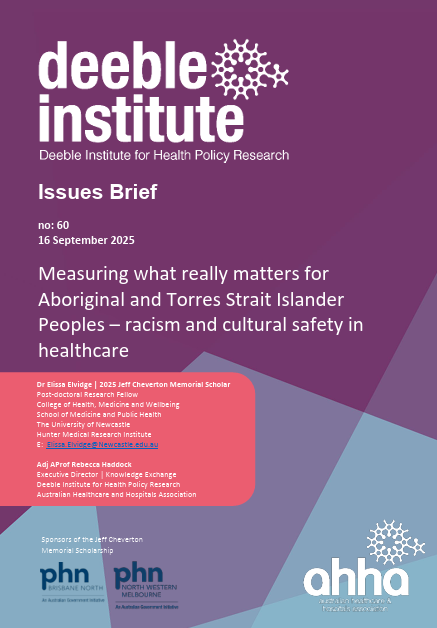 Deeble Issues Brief No. 60 - Measuring What Really Matters for Aboriginal and Torres Strait Islander Peoples – Racism and Cultural Safety in Healthcare
by
Institutional racism within Australian hospitals is a critical public health issue that profoundly impacts Aboriginal and Torres Strait Islander peoples. This racism is not merely a collection of isolated incidents; it’s a systemic problem that affects patients at both an individual and societal level. Experiences of racism and culturally unsafe care creates lack of safety in the system which contributes to poorer health outcomes, lifelong harm, and in some cases, preventable deaths.
While tools exist to assess institutional racism, they are not consistently applied, which limits accountability and progress.
This Issues Brief calls for a fundamental change in approach which moves away from fragmented, superficial measures toward a unified, data-driven, and Indigenous-led strategy.
Deeble Issues Brief No. 60 - Measuring What Really Matters for Aboriginal and Torres Strait Islander Peoples – Racism and Cultural Safety in Healthcare
by
Institutional racism within Australian hospitals is a critical public health issue that profoundly impacts Aboriginal and Torres Strait Islander peoples. This racism is not merely a collection of isolated incidents; it’s a systemic problem that affects patients at both an individual and societal level. Experiences of racism and culturally unsafe care creates lack of safety in the system which contributes to poorer health outcomes, lifelong harm, and in some cases, preventable deaths.
While tools exist to assess institutional racism, they are not consistently applied, which limits accountability and progress.
This Issues Brief calls for a fundamental change in approach which moves away from fragmented, superficial measures toward a unified, data-driven, and Indigenous-led strategy.
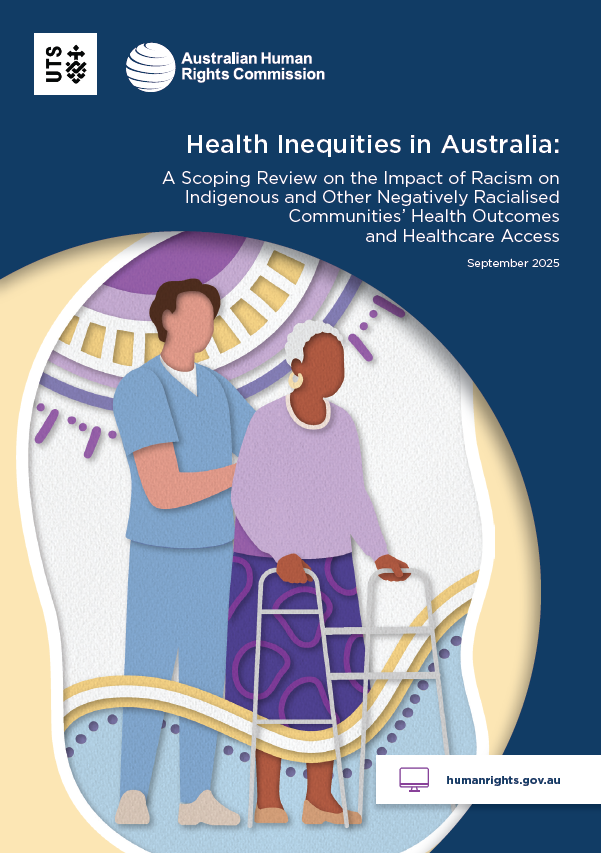 Health Inequities in Australia: A Scoping Review on the Impact of Racism on Indigenous and Other Negatively Racialised Communities’ Health Outcomes and Healthcare Access
by
Commissioned by the Australian Human Rights Commission, this scoping review investigates how racism affects health outcomes and access to healthcare for Aboriginal and Torres Strait Islander Peoples and other negatively racialised communities. It provides evidence-based recommendations to support the National Anti-Racism Framework and drive systemic reform and is also an education piece for practitioners in the health sector.
Health Inequities in Australia: A Scoping Review on the Impact of Racism on Indigenous and Other Negatively Racialised Communities’ Health Outcomes and Healthcare Access
by
Commissioned by the Australian Human Rights Commission, this scoping review investigates how racism affects health outcomes and access to healthcare for Aboriginal and Torres Strait Islander Peoples and other negatively racialised communities. It provides evidence-based recommendations to support the National Anti-Racism Framework and drive systemic reform and is also an education piece for practitioners in the health sector.
 An Introduction to Aboriginal and Torres Strait Islander Health Cultural Protocols and Perspectives
by
This document provides a guide to appropriate and respectful behaviour with Aboriginal and Torres Strait Islander people. It is intended to give RACGP members and staff background information and guidance on Aboriginal and Torres Strait Islander perspectives, along with an understanding of important protocols and other relevant cultural issues. It can be used to guide the RACGP’s overall engagement with Aboriginal and Torres Strait Islander people, communities and organisations in the improvement of their health and wellbeing.
An Introduction to Aboriginal and Torres Strait Islander Health Cultural Protocols and Perspectives
by
This document provides a guide to appropriate and respectful behaviour with Aboriginal and Torres Strait Islander people. It is intended to give RACGP members and staff background information and guidance on Aboriginal and Torres Strait Islander perspectives, along with an understanding of important protocols and other relevant cultural issues. It can be used to guide the RACGP’s overall engagement with Aboriginal and Torres Strait Islander people, communities and organisations in the improvement of their health and wellbeing.
 Overview of Aboriginal and Torres Strait Islander Health Status, 2017
by
The Overview of Aboriginal and Torres Strait Islander health status (Overview) aims to provide a comprehensive summary of the most recent indicators of the health and current health status of Australia’s Aboriginal and Torres Strait Islander people.
Overview of Aboriginal and Torres Strait Islander Health Status, 2017
by
The Overview of Aboriginal and Torres Strait Islander health status (Overview) aims to provide a comprehensive summary of the most recent indicators of the health and current health status of Australia’s Aboriginal and Torres Strait Islander people.
 Perioperative Mortality in New Zealand: Fifth report of the Perioperative Mortality Review Committee (the POMRC). Report to the Health Quality & Safety Commission New Zealand
by
This report presents information on perioperative mortality in New Zealand during 2009–2013 for two new clinical areas: 30-day mortality following operations and procedures under general anaesthesia and day-of-the week mortality. As part of the POMRC’s continued surveillance of perioperative mortality over time, rates for a number of clinical areas and procedures included in previous reports are presented here for 2009–2014.
Perioperative Mortality in New Zealand: Fifth report of the Perioperative Mortality Review Committee (the POMRC). Report to the Health Quality & Safety Commission New Zealand
by
This report presents information on perioperative mortality in New Zealand during 2009–2013 for two new clinical areas: 30-day mortality following operations and procedures under general anaesthesia and day-of-the week mortality. As part of the POMRC’s continued surveillance of perioperative mortality over time, rates for a number of clinical areas and procedures included in previous reports are presented here for 2009–2014.
 Working Together: Aboriginal and Torres Strait Islander Mental Health and Wellbeing Principles and Practice, 2e
by
This text is intended for staff and students and all health practitioners working in areas that support Indigenous mental health and wellbeing. It examines issues across the life course, with a greater focus on children and young people; the significant impacts of mental health in the justice system; the cultural determinants of social and emotional wellbeing and intellectual and developmental disabilities. It includes holisitic models of care, as well as interdisciplinary and inter-professional approaches and working with carers to deliver an even more robust text and resource.
Working Together: Aboriginal and Torres Strait Islander Mental Health and Wellbeing Principles and Practice, 2e
by
This text is intended for staff and students and all health practitioners working in areas that support Indigenous mental health and wellbeing. It examines issues across the life course, with a greater focus on children and young people; the significant impacts of mental health in the justice system; the cultural determinants of social and emotional wellbeing and intellectual and developmental disabilities. It includes holisitic models of care, as well as interdisciplinary and inter-professional approaches and working with carers to deliver an even more robust text and resource.
 For a comprehensive list of titles, see: Indigenous health
For a comprehensive list of titles, see: Indigenous health
 The Health of Aboriginal Australia
by
Improving the health status of Aboriginal and Torres Strait Islander peoples is a longstanding challenge for governments in Australia. While there have been improvements made in some areas since the 1970s overall progress has been slow and inconsistent. The inequality gap between Aboriginal and Torres Strait Islander peoples and other Australians remains wide and has not been progressively reduced. With a significant proportion of Aboriginal and Torres Strait Islander peoples in younger age groups, there is an additional challenge to programs and services being able to keep up with the future demands of a burgeoning population.
The Health of Aboriginal Australia
by
Improving the health status of Aboriginal and Torres Strait Islander peoples is a longstanding challenge for governments in Australia. While there have been improvements made in some areas since the 1970s overall progress has been slow and inconsistent. The inequality gap between Aboriginal and Torres Strait Islander peoples and other Australians remains wide and has not been progressively reduced. With a significant proportion of Aboriginal and Torres Strait Islander peoples in younger age groups, there is an additional challenge to programs and services being able to keep up with the future demands of a burgeoning population.
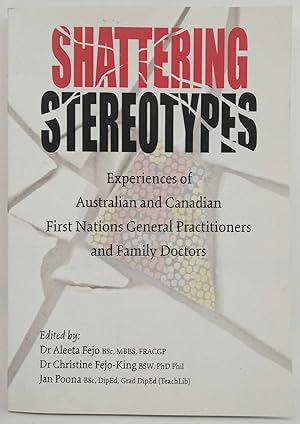 Shattering stereotypes : experiences of Australian and Canadian First Nations general practitioners and family doctors
by
Ch. 1: Introduction to the book Dr. Aleeta Fejo -- Ch. 2: Dear me Dr. Amy-Lea Perrin -- Ch. 2B: Comments by the editors -- Ch. 3: My father's daughter Dr. Aleeta Fejo -- Ch. 3B: Aleeta's partner -- Ned Elliott's story -- Ch. 4: The days in years Dr. Janelle Trees -- Ch. 4B: Janells' partner -- Claudia Jocher's story -- Ch. 5: Maskihkiwiniwiyân acimowin ewiyacimohstatikohk ôma kakitohskiskinomaksoyan ocih maskihkiwiniwiyân / My story of becoming a Nehiyaw (Cree) medical doctor Dr. James Makokis -- Ch. 5B: Parental dreams & aspirations: what any parent wants for their children Pat & Eugene Makokis -- Ch. 6: Kood jee wee win mesh qui si eq way Dr. Melinda Fowler -- Ch. 7: Reviewing what we have learned and opening new doors Dr. Aleeta Fejo.
Shattering stereotypes : experiences of Australian and Canadian First Nations general practitioners and family doctors
by
Ch. 1: Introduction to the book Dr. Aleeta Fejo -- Ch. 2: Dear me Dr. Amy-Lea Perrin -- Ch. 2B: Comments by the editors -- Ch. 3: My father's daughter Dr. Aleeta Fejo -- Ch. 3B: Aleeta's partner -- Ned Elliott's story -- Ch. 4: The days in years Dr. Janelle Trees -- Ch. 4B: Janells' partner -- Claudia Jocher's story -- Ch. 5: Maskihkiwiniwiyân acimowin ewiyacimohstatikohk ôma kakitohskiskinomaksoyan ocih maskihkiwiniwiyân / My story of becoming a Nehiyaw (Cree) medical doctor Dr. James Makokis -- Ch. 5B: Parental dreams & aspirations: what any parent wants for their children Pat & Eugene Makokis -- Ch. 6: Kood jee wee win mesh qui si eq way Dr. Melinda Fowler -- Ch. 7: Reviewing what we have learned and opening new doors Dr. Aleeta Fejo.
Note: some books listed here are not held by the ANZCA library; please use the Request chapter from library link if you would like to request chapters of these books.
Quick links
About ANZCA
Copyright © Australian and New Zealand College of Anaesthetists.